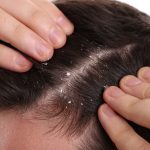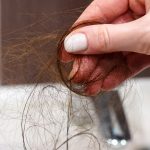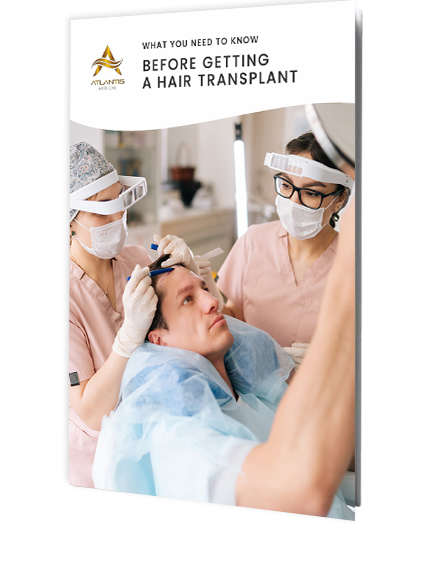Top Reasons Behind Itchy Scalp and Hair Loss — and How to Fix Them
- September 9, 2025
- Dr. Vikram Jayaprakash
Last updated on September 9, 2025
Table of Contents
ToggleUnderstanding the Link Between Scalp Health and Hair Growth
An itchy scalp can be more than a passing irritation. In some cases, it may signal that the scalp’s condition is affecting hair health. Ongoing discomfort is sometimes linked with hair thinning or shedding, as irritation or inflammation can disrupt the scalp’s balance and impact how well hair follicles function. Over time, this may lead to noticeable changes in hair density and texture.
In this latest blog post, we uncover the leading causes of itchy scalp and hair loss, share practical steps to help restore comfort and explain when it’s worth seeking professional advice to protect both scalp health and hair growth.
Why Itchy Scalp and Hair Loss Often Occur Together
The scalp is home to thousands of hair follicles, each playing a role in healthy growth. When the skin becomes inflamed, either from dryness, infection, or an underlying condition, it can disrupt the hair growth cycle. Over time, persistent irritation may weaken the follicles or cause hairs to shed prematurely. Addressing the cause early is key to preventing further discomfort and hair loss.
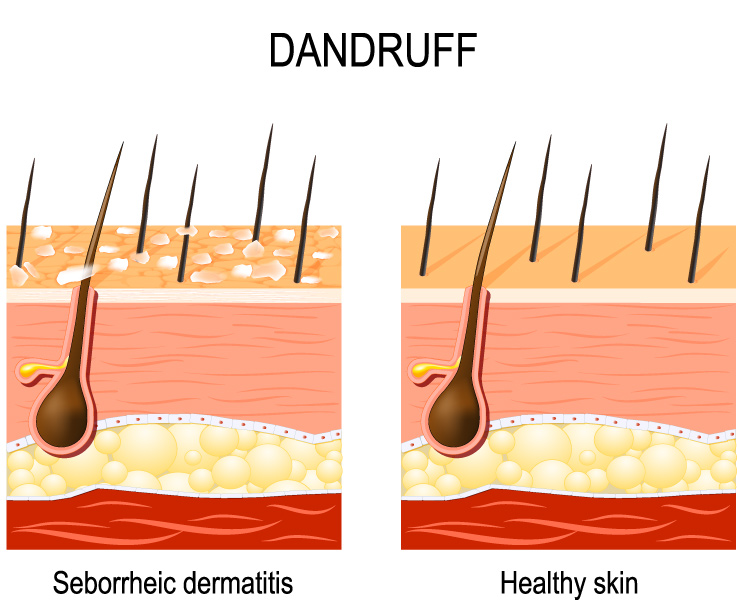
Common Causes of Itchy Scalp and Hair Loss
1. Dandruff and Seborrheic Dermatitis
Dandruff is one of the most frequent causes of an itchy scalp. In some cases, it’s linked to seborrheic dermatitis, an inflammatory condition caused by excess oil production and yeast overgrowth. This combination can lead to flaking, redness and irritation. Chronic inflammation may affect hair growth, especially if scratching damages the scalp’s surface.
2. Scalp Psoriasis
Psoriasis is an autoimmune condition that can affect the scalp, leading to thick, scaly patches and itching. While the condition itself doesn’t cause permanent hair loss, scratching or aggressive removal of scales can result in breakage and temporary shedding.
3. Folliculitis
Folliculitis occurs when hair follicles become inflamed due to bacterial or fungal infection. Symptoms can include redness, bumps, tenderness and itching. Severe or recurrent folliculitis may interfere with healthy hair growth.
4. Dry Scalp
A dry scalp can be caused by environmental changes, frequent washing with harsh shampoos, or low humidity. Without adequate moisture, the skin may become flaky and irritated, and hair may become brittle or prone to breakage.
5. Allergic Reactions or Contact Dermatitis
Some hair dyes, shampoos and styling products contain ingredients that can trigger an allergic response. This reaction, known as contact dermatitis, often causes itching, redness and sometimes hair loss if the reaction is severe or persistent.
When It Could Be Something More Serious
In some cases, an itchy scalp accompanied by hair loss may signal an underlying health condition. Fungal infections such as scalp ringworm, autoimmune conditions like alopecia areata, or hormonal changes can all cause these symptoms. Professional assessment is important to identify and address the root cause.
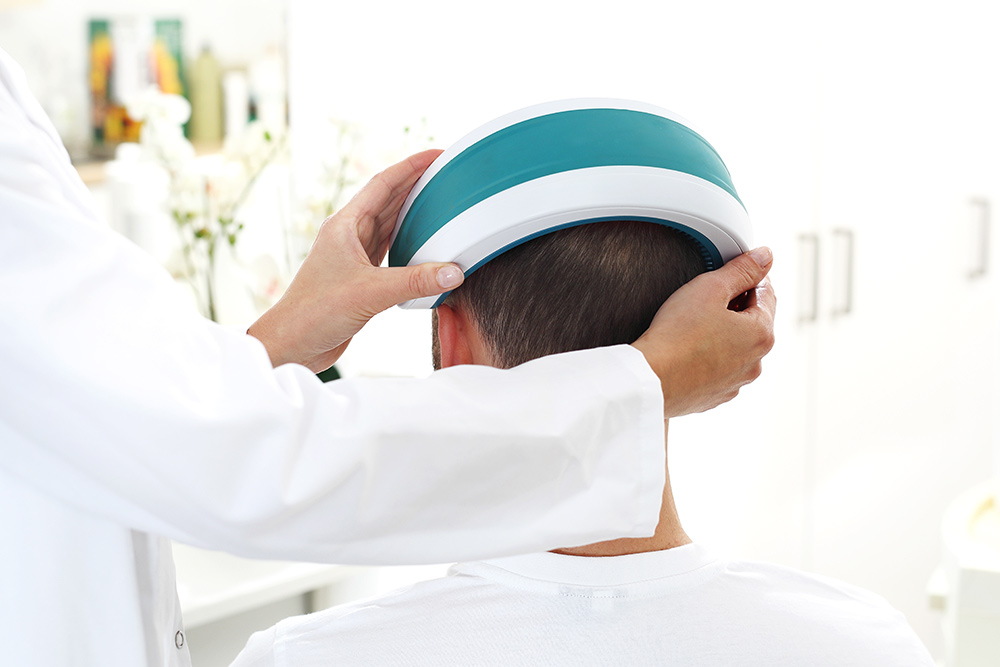
At-Home Relief and Prevention
While it’s essential to seek professional advice for ongoing or severe symptoms, some measures can help improve scalp comfort at home:
- Use a gentle shampoo suited to your scalp type (anti-dandruff, moisturising, or medicated)
- Avoid harsh chemicals and limit heat styling
- Keep the scalp hydrated, especially in dry weather
- Refrain from scratching, as this can worsen irritation and damage follicles
- Rinse hair thoroughly to remove any residue from products
Professional Solutions for Persistent Scalp Issues and Hair Loss
If scalp irritation and hair loss continue despite at-home care, a medical consultation is recommended. At Atlantis Medical, treatments are tailored to the cause and severity of the condition. Depending on your needs, options may include:
- Low-Level Laser Therapy to support scalp health and stimulate follicles.
- Hair transplant techniques such as FUE or FUT for advanced hair loss.
- Prescription treatments for inflammation, infection, or scalp conditions affecting growth.
These treatments are only recommended following a thorough assessment to ensure the most suitable approach for each individual.
Conclusion
Itchy scalp and hair loss often share the same triggers, from dandruff and dryness to inflammatory skin conditions. While some causes can be managed with the right hair care routine, others require medical attention to prevent further loss and restore scalp health. Addressing symptoms early can help maintain both scalp comfort and hair quality over time.
How to Book a Consultation
Booking your consultation is simple.
- Call us on (03) 9070 5234
- Contact us via our website
- Email us at enquiries@atlantismedical.com.au
- Or visit us at Level 2, 148 Glenferrie Road, Malvern, Vic 3144
Opening Hours
Mon – Fri: 8:30am – 5:00pm
Sat – Sun: Closed
Frequently Asked Questions
Can an itchy scalp cause hair loss?
In some cases, an itchy scalp can contribute to hair loss, particularly if persistent scratching damages the follicles. Treating the underlying cause can help protect both scalp comfort and hair growth.
What causes an itchy scalp and hair loss?
Common causes include dandruff, seborrheic dermatitis, psoriasis, folliculitis and allergic reactions to hair products. Identifying the cause early is key to preventing further irritation and shedding.
Does dandruff cause hair loss?
Dandruff itself does not directly cause permanent hair loss, but frequent scratching can weaken the hair shaft. Using a suitable anti-dandruff shampoo can help reduce irritation.
What are the natural ways to manage an itchy scalp and hair loss?
Gentle cleansing, avoiding harsh products and keeping the scalp hydrated can help relieve mild symptoms. Some people also benefit from using shampoos with soothing botanical extracts.
When to see a doctor for itchy scalp and hair loss?
If symptoms persist for more than a few weeks or worsen despite home care, a medical review is recommended. This can help identify and address any underlying scalp or health conditions.
What are the best treatments for itchy scalp and hair loss in Australia?
Treatment will depend on the cause and may include medicated shampoos, topical therapies, or in-clinic solutions such as low-level laser therapy. A professional consultation ensures the right approach for each individual.
Is an itchy scalp a sign of hair loss?
While an itchy scalp can sometimes occur alongside hair loss, it is not always a sign that shedding will follow. Many scalp conditions cause itching without affecting hair growth.
What treatments can help with itchy scalp and hair loss?
Options can include prescription medications, laser-based therapies and surgical solutions for advanced hair loss. The right treatment is based on a full scalp and hair assessment.
Any surgical or invasive procedure carries risks. Before proceeding, you should seek a second opinion from an appropriately qualified health practitioner.

About the Author
Dr. Vikram Jayaprakash
Dr. Vikram Jayaprakash is the Clinical Director of Atlantis Medical, one of Melbourne’s premier hair restoration clinics. Trained at the University of Southampton Medical School, he spent over a decade working alongside Dr. Russell Knudsen at the renowned Knudsen Clinic before establishing his own practice. As one of only three doctors in Australia to hold Board Certification from The American Board of Hair Restoration Surgery and one of two to attain Fellowship status with the International Society of Hair Restoration Surgery, Dr. Jayaprakash brings unparalleled expertise to every procedure.
Categories
Categories
- Female Hair Loss (6)
- General (3)
- Hair Health (6)
- Hair Loss (12)
- Hair Loss Treatment (7)
- Hair Transplant (18)
- Male Hair Loss (8)
- Non Surgical Treatments (1)
- Scalp Health (3)



